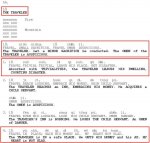Clarity,
Office 17622,
PO Box 6945,
London.
W1A 6US
United Kingdom
Phone/ Voicemail:
+44 (0)20 3287 3053 (UK)
+1 (561) 459-4758 (US).


<name>The activity</name>
<comment>A steadfast commitment is beneficial.</comment>
<linecomments>
<line index="1" comment="Don't act too fast."/>
<line index="6" comment="It is time to make a pause and take care of the world around you or else..."/>
</linecomments> <name>Evolution</name>
<comment>Changing to obtain quality work.</comment>
<linecomments>
<line index="1" comment="One is still too weak to act."/>
<line index="6" comment="One is getting into troubles."/>

Clarity,
Office 17622,
PO Box 6945,
London.
W1A 6US
United Kingdom
Phone/ Voicemail:
+44 (0)20 3287 3053 (UK)
+1 (561) 459-4758 (US).